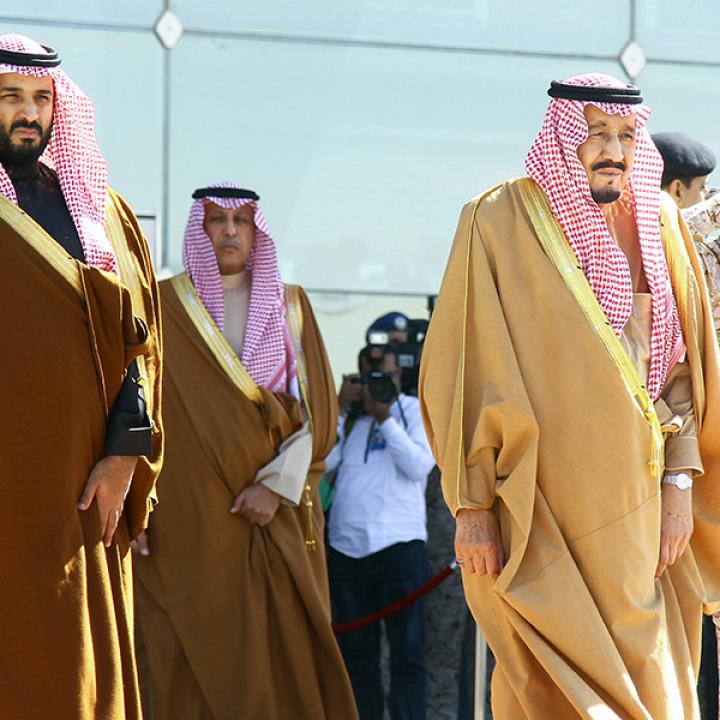

The virtual G20 meeting in Riyadh will be watched closely for insights on the kingdom’s royal politics at home and its standing abroad.
Apart from photo lineups of world leaders, the annual Group of Twenty economic summit normally gets limited media coverage. This year’s meeting, scheduled as a virtual event on November 21-22, will likely be different—though not in ways that its Saudi hosts may want.
The summit’s slogan is “Realizing Opportunities of the 21st Century for All,” with the G20 website highlighting ideas such as “Empowering People,” Safeguarding the Planet,” and “Shaping New Frontiers.” The representatives of the major world economies in attendance—nineteen countries plus the European Union—are expected to endorse a variety of initiatives previously agreed to by finance ministers and central bankers, including a mechanism to boost IMF funding for poorer nations.
The Saudis will likely be represented by Crown Prince Muhammad bin Salman (known as MbS), who stood smiling in the front row between President Trump and Japanese prime minister Shinzo Abe during last year’s photo lineup in Osaka. This contrasted with the 2018 meeting in Buenos Aires, when world leaders visibly tried to avoid the crown prince just two months after the murder of Saudi dissident journalist Jamal Khashoggi. MbS only heightened this apparent discomfort when he high-fived Russian president Vladimir Putin at one of the formal sessions.
A checklist of items to look out for this year includes the following:
Will King Salman make an appearance? Although MbS has become Saudi Arabia’s top decisionmaker in practice, his ailing eighty-four-year-old father still chairs the kingdom’s weekly Council of Ministers meetings from a specially outfitted video studio in his palace. He may want to have a virtual presence at the summit as well, even though his ability to do anything more than read a prepared speech is questionable. He likely cannot lead discussions, but his appearance alone would add to the impression that he is still the kingdom’s ultimate authority—particularly when it comes to holding back Saudi moves toward normalization with Israel amid new peace initiatives by Gulf neighbors and his son’s presumed enthusiasm for deeper relations with Jerusalem.
Which world leaders will participate? Since Khashoggi’s murder, leaders of democratic countries have been less eager to meet with MbS, even though he could succeed his father and reign for the next fifty years. The kingdom’s highly publicized detention of women activists has only increased this hesitance. The best known is Loujain al-Hathloul, who advocated women’s right to drive before MbS declared it as one of his own reforms. Imprisoned since 2018 and reportedly subjected to torture, she has been on a hunger strike in her cell for the past month. A new report by British parliamentarian Baroness Helena Kennedy alleges that Saudi female detainees have also been sexually mistreated.
Which non-G20 countries are invited? As the summit’s host, Riyadh has the right to invite a few non-member states, and its final list could say much about the status of Saudi royal politics. This is particularly true if it excludes the United Arab Emirates, where Crown Prince Muhammad bin Zayed—the country’s de facto leader and a known mentor to MbS—has spearheaded the recent Gulf normalization drive with Israel.
Which Turkish officials will attend? Although Ankara has sought to maintain formal ties with King Salman, President Recep Tayyip Erdogan’s antipathy toward MbS is well-known. Turkey’s choice of virtual delegation may depend on the extent to which it believes attending the summit looks like an endorsement of MbS. If Ankara’s representative is only an ambassador or senior official, this will be interpreted as a diplomatic snub.
When Saudi Arabia was originally named as host in July 2017, this year’s G20 summit was widely seen as an occasion to bolster the crown prince’s position and promote his “Vision 2030” plan to shift the Saudi economy away from oil dependence. Although low oil prices and the COVID-19 crisis have since reduced revenues and investment, MbS claimed last week that his ongoing reforms have saved the kingdom from even greater austerity. Yet that may be small relief for the many Saudis who have been hit by higher prices, a tripling of value-added tax, and subsidy cutbacks for public-sector workers.
Simon Henderson is the Baker Fellow and director of the Bernstein Program on Gulf and Energy Policy at The Washington Institute.



